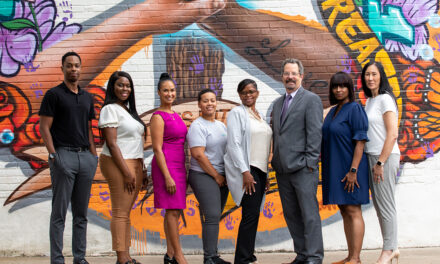by Rebecca Little
In 1998, Marci Schankweiler’s husband Pete Bossow was diagnosed with a rare type of testicular cancer. Thirteen months later, he passed away at age 30. Devastated and adrift, she returned to her job as a tax attorney, unsure if it was still the right path for her. “I was a young widow. I had said goodbye to my best friend,” Schankweiler says. “The priorities I had in life really shifted.”
Schankweiler, who grew up in Doylestown, Pa., and now lives in North Wales, Pa., couldn’t shake the idea of starting a non-profit dedicated to helping cancer patients and their families. Then, one Friday morning, she went into work as usual—but by afternoon, she had given her notice. “I just had this strong peace that came over me that it was not the journey I was supposed to travel,” she says.
Although she felt confident about her decision, her mom thought she was having a nervous breakdown. Schankweiler walked away from a stable job and income, the culmination of seven years of attending school at night to earn her law degree and post-law tax degree, and started For Pete’s Sake Cancer Respite Foundation—a non-profit providing respite vacations to young-adult cancer patients from New Jersey, Pennsylvania, and Delaware. The idea came from Bossow himself. While he was sick, friends threw a “beef and beer” to raise money for the couple to use toward a vacation, and they took a 17-day trip to the Caribbean. “That trip helped us reconnect and to refresh our minds, our bodies, and our souls, and we also had some really challenging conversations about what the future held,” she says. “We realized that cancer can destroy a lot, but it can’t destroy love.”
Schankweiler says her late husband had felt isolated as a man in his late 20s suffering from cancer and wanted to create a way to offer support to an underserved group. He saw the organization as a way to reach out to young-adult cancer patients.
To Schankweiler, the risk to make Bossow’s vision a reality was worth it. She figured if the foundation never got off the ground, she had her education to fall back on. “I’m not sure back then I appreciated the significance of the risk,” she says. “I was definitely driven by my own emotions.”
The organization is now in its 14th year and helps an average of 100 families per year. In 2012, For Pete’s Sake completed 99 trips—which included 348 patients, caregivers, and kids. Although the patient has cancer, their children and spouse, usually the caregiver, are also swept up into the world of doctor appointments, treatment, and illness. “We try to give them a break,” Schankweiler says.
Firsthand Knowledge
Susan Schultz knows the value For Pete’s Sake provides. Her late husband, Dan, and their four children were able to travel to Disney World in May 2011, courtesy of the organization, providing the family with a break from Dan’s brutal chemotherapy regimen. Dan had battled sarcoma for two years and endured several clinical trials. The Schultz family’s life centered on flights to the Mayo Clinic, at-home IV treatments, and the logistics of managing Dan’s health. Susan was stretched to the limit and says she never would have had the time to plan a trip, even if they had the financial means. “They planned it and handed everything to us on a plate,” Schultz says. “Here’s your rental car, here’s your flight, here are your tickets.”
She describes the time in Orlando as magical. “It was about being together as a family,” she says. “Dan forgot about his treatments and cancer. It was just him being a dad.”
The day Dan passed away in June 2012, the children—a 9-year-old daughter and 6-year-old triplets—were sitting around his hospice bed sharing their favorite memories. The oldest daughter had a wealth of moments and milestones from which to choose. But the triplets, two girls and a boy, were just 4 when their dad was diagnosed. “The only thing they talked about was Disney,” Schultz says. “My biggest fear has always been that they would forget Dan, but that trip made such an impact that they do [remember]. That’s a gift I could never repay. That memory is priceless to the kids and me.”
Schankweiler says patients, their families, and the oncologists agree there is a therapeutic benefit to respite. “We promote that benefit, so they can return to laughing,” she says. “If you don’t laugh, your lives become very focused on the pain of cancer.”
Schankweiler is now remarried and a mom to 8- and 10-year- old daughters. As of August 2013, her organization has sent more than 3,500 people on vacation.







